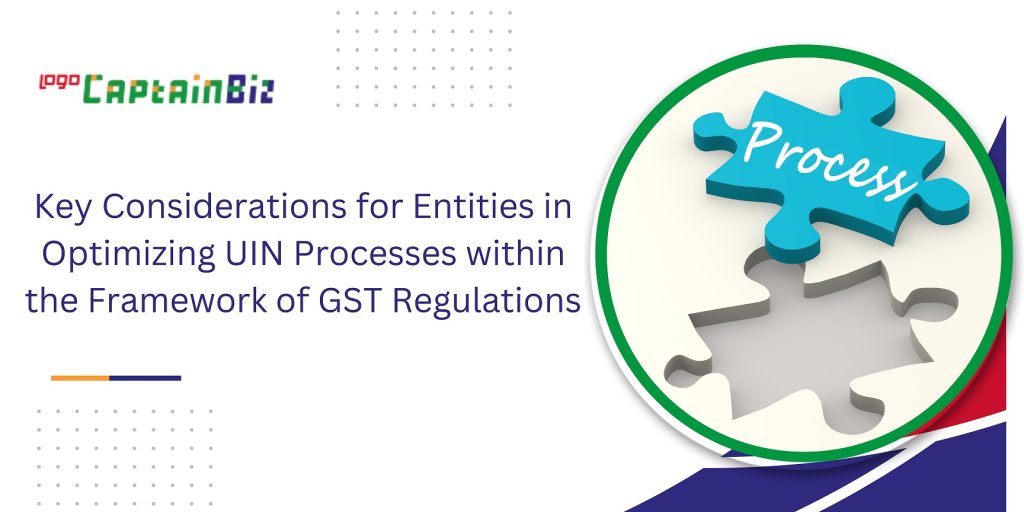A Unique Identification Number is known as a UIN. The 15-digit UIN code is made up of both numbers and letters. Instead of a GSTIN, it is the registration number issued to a select group of people.
These are the following: An entity notified under the United Nations (Privileges and Immunities) Act, 1947, or a specialized agency of the United Nations Organisation, Embassy or consulate of a foreign nation, and anyone the Commissioner notifies.
Using the UIN, the organization can claim a tax return for purchases of imported products and services. Moreover, the current GST system in India exempts specific individuals and entities from paying taxes. As a result, the authorities return any direct or indirect taxes gathered from these individuals or entities to them.
Navigating the Eligibility Criteria and Benefits of UIN Registration for Specific Entities
The eligibility criteria to apply for a UIN are also as follows:
- An organization inside the United Nations (UNO) with specialized functions
- The United Nations (Privileges and Immunities) Act of 1947 designates several multilateral financial institutions and organizations.
- An embassy or consulate of another country
- Any other group of individuals that the Commissioner designates
The UIN aims to ensure that the organization that receives it obtains a tax fund from purchasing goods and services.
Proactive Steps for Entities seeking to obtain and maintain UIN Registration under GST
Applying for a unique identification number (UIN) takes three working days, and the steps are as follows:
Registration
The entities must use Form GST REG-13 to apply for a UIN. If satisfied, the relevant officer will assign a UIN and provide a certificate in Form GST REG-06 within three working days of the application’s submission date. This is the Form GST REG-13 format.
Following the UIN Requirements
The registrant needs to meet the requirements listed below:
- The invoices must include the UIN.
- Regard these sales as supply transactions (B2B) to another registered individual.
- The process for uploading invoices should be the same as regular B2B sales.
Document List
You must submit the list of the documents:
- A valid copy of the GST RFD-10 Form
- Good Copy of GSTR-11 Form
- An invoice statement
- Each quarter’s reimbursement letter
- Purchase Certificate, if the products’ purchase is eligible for a tax return
- Undertaking certificate, if the tax refund relates to the acquisition of services
- A copy of a letter on the reciprocity principle issued by the Ministry of External Affairs
- Authorization letter for GST reimbursement related to car purchase
Filing Returns
All UIN holders who wish to receive a refund of the taxes they paid on their imported goods must file GSTR-11 by the 28th of the following month. Therefore, information about such supplies of taxable goods or services will be included in GSTR-11. Since the data in GSTR-11 will be automatically filled in from the seller’s GSTR-1 (sales), a UIN holder cannot add or change any information.
Refunds are only available to UIN holders via the GSTR 11. For this form to be considered genuine, it also must be submitted six months from the month the supply was received. Moreover, if you do not lodge a refund claim within these six months, it will no longer be applicable.
Key Considerations for Entities in Optimizing UIN Processes within the Framework of GST Regulations

Organizations looking to streamline their Unique Identification Number (UIN) procedures by Goods and Services Tax (GST) laws should also give several important factors top priority.
- Correct and current data is necessary for effective UIN administration since consistency could result in problems with compliance.
- You can automate processes for tracking and generating UINs to increase productivity and lower error rates.
- We must maintain a robust UIN validation and verification system to comply with GST requirements.
- Frequent audits and inspections of UIN-related processes can assist in spotting and fixing any possible problems, guaranteeing flawless GST compliance.
- To maintain compliance in a changing regulatory environment and adjust UIN processes appropriately, staying current on any upgrades or changes in GST legislation is imperative.
In summary, companies seeking to optimize their UIN procedures inside the GST framework must have a proactive, technology-driven strategy and a solid commitment to compliance.
Strategizing for Success: Leveraging UIN Registration to Enhance International Trade Capabilities
By promoting speed, transparency, and confidence among international stakeholders, implementing a simplified and globally recognized Unique Identification Number (UIN) registration system will significantly improve the capacities of international trade.
When this system is smoothly integrated across national borders, it makes it easier to identify the entities participating in trade transactions quickly and accurately, which lowers bureaucratic barriers and makes doing business easier overall.
By acting as a standardized marker, the UIN registration can guarantee adherence to global laws and foster a safe atmosphere for cross-border transactions. Moreover, nations may empower businesses to navigate international trade more confidently by utilizing technology to establish a unified global UIN network. This will also ultimately promote economic growth and collaboration on a worldwide scale.
Lessons learned from Entities effectively managing UIN Obligations and Staying Compliant
Businesses that successfully handle their obligations with Unique Identification Numbers (UINs) and maintain compliance show that they value efficient procedures, strong data governance, and also proactive risk reduction. A thorough understanding of UIN standards is a top priority for successful organizations since it guarantees accurate and current data collection and management.
They put in place safe procedures to protect private data, do frequent internal audits, and spend money on employee training to promote a compliance culture. These organizations also keep up with legislative developments, quickly adjusting to modifications in UIN requirements to preserve a robust legal operating framework.
Proactive Steps for Entities seeking to enhance Compliance with UIN Registration Requirements
Entities should use software that does the following to meet compliance:
- Bulk Data Upload feature: Quickly and easily upload data for several GSTINs simultaneously.
- GSTR 2A and GSTR 2B Bulk Download: Sending a single “Get GSTR 2A/2B data” request for several periods will streamline the procedure.
- Summary: Retrieve a summary of the submitted data, along with the number of invoices that we are taking into account for reconciliation.
- Smart Reconciliation: Apply sophisticated algorithms to your data to produce reconciliation outcomes that also include a thorough synopsis.
- Net Vendor Summary: This provides a summary of each vendor’s aggregated reconciliation status
- Advanced Reconciliation: Use rules like fuzzy invoice number logic, precise value checks that ignore invoice numbers, tolerance-based checks, and more to broaden the scope of comparison between supplier-only and purchaser-only data.
- Reports at the PAN and GSTIN levels: Examine supplier-only and buyer-only invoices in-depth using reports produced at both levels.
- Forward Mail: With this functionality, differences may be easily communicated to vendors.
Exploring the Impact and Advantages of a Well-Executed UIN Strategy for Entities Subject to UIN Registration
For entities required to register for a Unique Identification Number (UIN), several benefits can be obtained through a UIN strategy. Also, here are a few possible advantages:
- Accurate and Efficient Identification: UINs provide every entity with a unique identification number, guaranteeing precise and effective identification. This can improve overall operating efficiency, cut down on errors, and streamline a variety of operations.
- Regulation Compliance: Regulatory agencies frequently require the usage of UINs for particular businesses or transactions. Following the guidelines for UIN registration guarantees adherence to regulatory standards and lowers the possibility of fines and legal problems.
- Data Accuracy: Enhanced data accuracy is facilitated by UINs. Tracking and maintaining information about each entity is simpler by giving it a unique number. Moreover, this can assist in keeping a clean and accurate database and preventing record duplication.
Further Benefits of a UIN Strategy
- Promotes Integration: UINs have the potential to encourage information system integration. Better coordination and collaboration across various departments or organizations is made possible by the seamless integration of databases and systems available to entities subject to UIN registration.
- Streamlined Documentation: UINs make record-keeping more orderly. Each unique identifier can link entities required to register for UINs to extensive records. Moreover, this facilitates efficient record administration and makes information retrieval easier.
- Enhanced Security: Information security can be improved with UINs. Organizations can use security and access controls to safeguard sensitive information connected to each entity by employing a unique identifier. This also aids in preventing unauthorized access to data.
- Analysis and Reporting: UINs make data reporting and analysis easier. Entities can use the distinct IDs linked to each other to create reports, do studies, and obtain essential insights. This also encourages making well-informed decisions.
- Communication Ease: UINs can make communication procedures simpler. Using a standardized UIN facilitates information interchange between entities and regulatory agencies. Moreover, it lessens the possibility of misunderstandings and poor communication.

